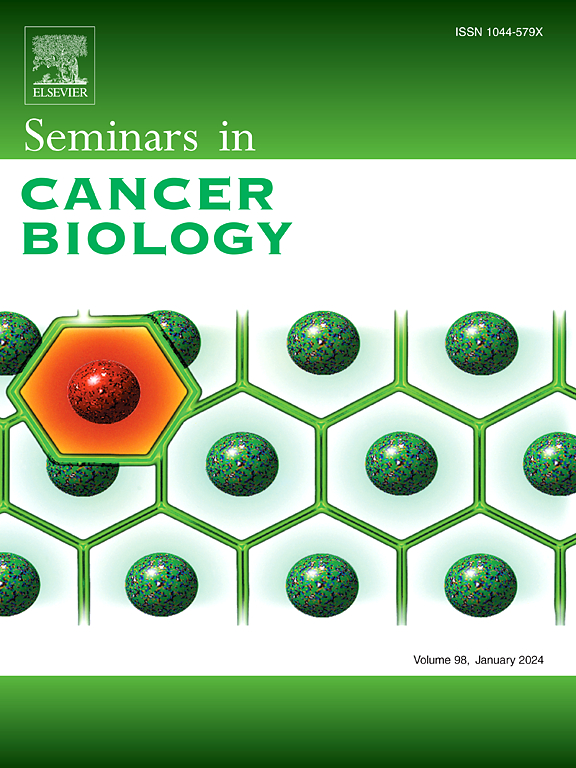Pancreatic neuroendocrine neoplasms (pNENs): Genetic and environmental biomarkers for risk of occurrence and prognosis
IF 12.1
1区 医学
Q1 ONCOLOGY
引用次数: 0
Abstract
Pancreatic neuroendocrine neoplasms (pNENs) are rare and heterogeneous tumors arising from neuroendocrine cells, representing approximately 10 % of all Gastro-Entero-Pancreatic neuroendocrine neoplasms. While most pNENs are sporadic, a subset is associated with genetic syndromes such as multiple endocrine neoplasia type 1 (MEN1) or von Hippel-Lindau disease (VHL). pNENs are further classified into functioning and non-functioning tumors, with distinct clinical behaviors, prognoses, and treatment approaches. This review explores genetic and environmental biomarkers that influence the risk, prognosis, and therapeutic responses in pNENs. The epidemiology of pNENs reveals an increasing incidence, primarily due to advancements in imaging techniques. Genetic factors play a pivotal role, with germline mutations in MEN1, VHL, and other genes contributing to familial pNENs. Somatic mutations, including alterations in the mTOR pathway and DNA maintenance genes such as DAXX and ATRX, are critical in sporadic pNENs. These mutations, along with epigenetic dysregulation and transcriptomic alterations, underpin the diverse clinical and molecular phenotypes of pNENs. Emerging evidence suggests that epigenetic changes, including DNA methylation profiles, can stratify pNEN subtypes and predict disease progression. Environmental and lifestyle factors, such as diabetes, smoking, and chronic pancreatitis, have been linked to an increased risk of sporadic pNENs. While the association between these factors and tumor progression is still under investigation, their potential role in influencing therapeutic outcomes warrants further study. Advances in systemic therapies, including somatostatin analogs, mTOR inhibitors, and tyrosine kinase inhibitors, have improved disease management. Biomarkers such as Ki-67, somatostatin receptor expression, and O6-methylguanine-DNA methyltransferase (MGMT) status are being evaluated for their predictive value. Novel approaches, including the use of circulating biomarkers (NETest, circulating tumor cells, and ctDNA) and polygenic risk scores, offer promising avenues for non-invasive diagnosis and monitoring. Despite these advancements, challenges remain, including the need for large, well-annotated datasets and validated biomarkers. Future research should integrate multi-omics approaches and leverage liquid biopsy technologies to refine diagnostic, prognostic, and therapeutic strategies. Interdisciplinary collaborations and global consortia are crucial for overcoming current limitations and translating research findings into clinical practice. These insights hold promise for improving prevention, early detection, and tailored treatments, ultimately enhancing patient outcomes.
求助全文
约1分钟内获得全文
求助全文
来源期刊

Seminars in cancer biology
医学-肿瘤学
CiteScore
26.80
自引率
4.10%
发文量
347
审稿时长
15.1 weeks
期刊介绍:
Seminars in Cancer Biology (YSCBI) is a specialized review journal that focuses on the field of molecular oncology. Its primary objective is to keep scientists up-to-date with the latest developments in this field.
The journal adopts a thematic approach, dedicating each issue to an important topic of interest to cancer biologists. These topics cover a range of research areas, including the underlying genetic and molecular causes of cellular transformation and cancer, as well as the molecular basis of potential therapies.
To ensure the highest quality and expertise, every issue is supervised by a guest editor or editors who are internationally recognized experts in the respective field. Each issue features approximately eight to twelve authoritative invited reviews that cover various aspects of the chosen subject area.
The ultimate goal of each issue of YSCBI is to offer a cohesive, easily comprehensible, and engaging overview of the selected topic. The journal strives to provide scientists with a coordinated and lively examination of the latest developments in the field of molecular oncology.
 求助内容:
求助内容: 应助结果提醒方式:
应助结果提醒方式:


